|
|
|
Sort Order |
|
|
|
Items / Page
|
|
|
|
|
|
|
| Srl | Item |
| 1 |
ID:
196956


|
|
|
|
|
| Publication |
New Delhi, Pentagon Press, 2025.
|
| Description |
xxxviii, 314p.: tables, boxes, figureshbk
|
| Standard Number |
9788198285782
|
|
|
|
|
|
|
|
|
|
|
|
Copies: C:2/I:0,R:0,Q:0
Circulation
| Accession# | Call# | Current Location | Status | Policy | Location |
| 060788 | 337.5/KUM 060788 | Main | On Shelf | General | |
| 060789 | 337.5/KUM 060789 | Main | On Shelf | General | |
|
|
|
|
| 2 |
ID:
156803
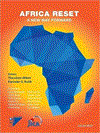

|
|
|
|
|
| Publication |
New Delhi, Oxford University Press, 2017.
|
| Description |
xxiii, 260p.: figures, tables, boxeshbk
|
| Standard Number |
9780199485024
|
|
|
|
|
|
|
|
|
|
|
|
Copies: C:1/I:0,R:0,Q:0
Circulation
| Accession# | Call# | Current Location | Status | Policy | Location |
| 059259 | 330.96/AHL 059259 | Main | On Shelf | General | |
|
|
|
|
| 3 |
ID:
125273
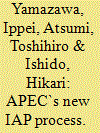

|
|
|
|
|
| Publication |
2013.
|
| Summary/Abstract |
In Order to fulfill the leaders` commitment 2010, all APEC economics have renews their IAP process under new guideline. An academic assessment of the efforts to achieve the Bogor goals in 2020 leads to the following question: How have they implemented in their IAPs the Bogor Goals progress report guideline adopted last year? How much have they achieved towards the Bogor Goals at the current stage? In which areas do they need to strengthen their implementation? This article seeks to objectively assess individual economics by individual area so that their remaining tasks will be clarified, although the mid-term assessment of 2010 adopted a group assessment of the thirteen economics, This paper makes an overall assessment and recommendations to the APEC SOM (Senior Office Meeting) regarding how to strengthen the new IAP process.
|
|
|
|
|
|
|
|
|
|
|
|
|
|
|
|
| 4 |
ID:
124519
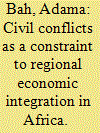

|
|
|
|
|
| Publication |
2013.
|
| Summary/Abstract |
Regional economic integration is crucial for African countries, notably since they are characterized by small domestic markets. In this paper, we analyze how civil conflicts affect the economic fate of regional economic communities through its effect on the synchronicity of regional partners' economies. We find that conflict decreases business cycle synchronicity when it occurs within a regional economic community, both for the directly affected countries and for their more peaceful regional peers. We therefore find an additional reason to recommend putting prevention and resolution of civil conflicts on the top of the political agenda of African RECs.
|
|
|
|
|
|
|
|
|
|
|
|
|
|
|
|
| 5 |
ID:
076453


|
|
|
| 6 |
ID:
128020


|
|
|
|
|
| Publication |
2014.
|
| Summary/Abstract |
Northeast Asia's regional cooperation is abysmal. Although China, South Korea, and
Japan have generally compartmentalized bilateral trade relations in order to ensure
continuing prosperity of their respective economies, regionally institutionalized
cooperation remains weak, even in this domain. Trilateral political and security
cooperation among these states is virtually nonexistent. China's disinclination (as
an emerging regional hegemon) toward regional cooperation and Japan's failure
to settle its historical problems are regarded as the key reasons for the lack of
such a development. Yet despite this fraught situation the prospects for regional
cooperation among the three main Northeast Asian powers have seen glimmers of
hope. This paper argues that security is surprisingly one of the areas where scholars
and practitioners envision a foundation for increased opportunities for regional
cooperation. The most noteworthy case is the ongoing coordination among
China, Japan, and South Korea (along with some others) to fight piracy in the
Gulf of Aden area. Beyond the result of reducing piracy on commercial shipping,
the counter-piracy effort has fostered cultural exchange among the region's different
navies and coastguards, offering opportunities for growing the spectrum of maritime
security expertise beyond what each country would be able to do alone. This
paper looks at the implications of this combined effort for other potential areas of
cooperation among the Northeast Asian states
|
|
|
|
|
|
|
|
|
|
|
|
|
|
|
|
| 7 |
ID:
120737
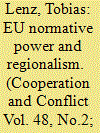

|
|
|
|
|
| Publication |
2013.
|
| Summary/Abstract |
The ideational impact captured by Manners's notion of normative power Europe (NPE) appears most distinct and potentially most consequential in the realm of regionalism. However, empirical research on the topic has been hampered by the focus on EU actorness and methodological difficulties. Drawing on diffusion theory, this article develops conceptual, theoretical and methodological foundations for conceiving NPE as ideational diffusion. It argues that Europe's ideational influence on regionalism can be fruitfully understood as the largely indirect process by which the EU experience travels to other regions through socialization and emulation. Yet, as structural conditions vary across regions, EU ideational diffusion rarely leads to similar or even comparable institutional practices and outcomes. A choice-orientated approach is proposed for examining these claims empirically, which focuses on specifying the underlying counterfactual: political decisions in regionalism would have been different in the absence of the EU. The article concludes by outlining the analytical and normative promise of the proposed recasting of Manners's original concept.
|
|
|
|
|
|
|
|
|
|
|
|
|
|
|
|
| 8 |
ID:
133438
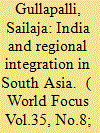

|
|
|
|
|
| Publication |
2014.
|
| Summary/Abstract |
Almost two decades ago, India unveiled its 'looks East Policy" to enhance its trade and commercial relations with the countries of the South East Asian Region. Infact, it vigorously pursued its entry in to the regional group and by December, 2012, it did achieve much progress by taking the economic relations to further levels. From being a sectoral dialogue partner to forging free-trade agreement, India has come a long way in the pursuit of its economic interests.
|
|
|
|
|
|
|
|
|
|
|
|
|
|
|
|
| 9 |
ID:
145126
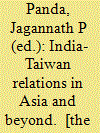

|
|
|
|
|
| Publication |
New Delhi, Pentagon Press (IDSA), 2016.
|
| Description |
xv, 120p.hbk
|
| Standard Number |
9788182749047
|
|
|
|
|
|
|
|
|
|
|
|
Copies: C:2/I:0,R:0,Q:0
Circulation
| Accession# | Call# | Current Location | Status | Policy | Location |
| 058662 | 327.51051249/PAN 058662 | Main | On Shelf | General | |
| 058663 | 327.51051249/PAN 058663 | Main | On Shelf | General | |
|
|
|
|
| 10 |
ID:
145000
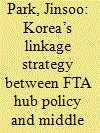

|
|
|
|
|
| Summary/Abstract |
This article focuses on Korea’s free trade agreement (FTA) hub policy and its implication for Korea’s role in the regional integration process of the Asia-Pacific. It particularly bridges a gap in the existing literature, addressing why Korea, pursuing an FTA hub nation, simultaneously takes a proactive approach toward a range of regional projects. It argues that Korea’s FTA hub policy has not been solely driven by economic consideration, and the Korean government’s intent to use an FTA hub status to gain political objectives is equally, or even more, important. In particular, Korea has linked its FTA hub policy and the exercise of middle power leadership in the shaping of the regional trade architecture. The Korean government has perceived Korea’s FTA hub status as a useful instrument for Korea’s leading roles such as facilitating regional trade liberalization, managing its manners and sequence, and mediating between the USA-led and the China-led regional initiatives.
|
|
|
|
|
|
|
|
|
|
|
|
|
|
|
|
| 11 |
ID:
152292
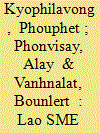

|
|
|
|
|
| Summary/Abstract |
This study aims to investigate the participation of Lao SMEs in regional economic integration. Supporting SMEs’ participation in regional economic integration is important to increase their productivity and competitiveness. However, there are various barriers that prevent this from occurring. In this study, a Logit model is applied to secondary data to investigate factors affecting exporting behaviour and preferential tariff utilization. This study finds that there are weak linkages between Lao firms and regional economic integration. Very few firms are exporting and the level of preferential tariff utilization is relatively low. Firms have a low level of awareness of economic integration and they appear to be too optimistic about its impact. It is important that policymakers should provide training on FTAs to export-oriented firms and potential exporters, together with a wider promotion of FTA utilization through media channels.
|
|
|
|
|
|
|
|
|
|
|
|
|
|
|
|
| 12 |
ID:
152286


|
|
|
|
|
| Summary/Abstract |
For decades, Myanmar’s economic system has been characterized by central planning and international isolation. Today, as the country undergoes a far-reaching political and economic transition, it is leaving this past behind. For Myanmar’s enterprises, and SMEs in particular, the opening of the country’s economy and the intensification of regional economic integration through the ASEAN Economic Community brings both opportunities and challenges. It is in this context that the present study investigates the extent of Myanmar SME participation in ASEAN and East Asian regional economic relations as well as the challenges they face and the policy support they need for deeper integration. More specifically, this paper addresses the following four questions: What is the state of Myanmar SMEs’ participation in regional trade, production networks, and investment activities? What are the enabling factors and obstacles to SME participation in regional economic activities? How are regional and preferential trade agreements affecting SMEs’ activities and performance? And what are the policy imperatives to promote active participation of Myanmar SMEs in regional economic integration? To find answers to these questions, this study not only analyses existing secondary data but also draws on a new dataset collected by the Centre for Economic and Social Development (CESD) through a survey among Myanmar enterprises which focuses on the food-processing and garment sectors. It is found that, at present, Myanmar SMEs hardly participate in regional economic activities. They face numerous challenges such as: constrained access to capital and skills; limited investment in technology, innovation and human capital; minimal usage of ICT; and low awareness of regional integration dynamics. To overcome these challenges and reap the benefits of regional economic integration, enhanced firm-level efforts are needed while the government can provide support on various fronts.
|
|
|
|
|
|
|
|
|
|
|
|
|
|
|
|
| 13 |
ID:
127866


|
|
|
|
|
| Publication |
2014.
|
| Summary/Abstract |
We use panel cointegration techniques to examine the relationship between renewable energy consumption, trade and output in a sample of 11 African countries covering the period 1980-2008. The results from panel error correction model reveal that there is evidence of a bidirectional causality between output and exports and between output and imports in both the short and long-run. However, in the short-run, there is no evidence of causality between output and renewable energy consumption and between trade (exports or imports) and renewable energy consumption. Also, in the long-run, there is no causality running from output or trade to renewable energy. In the long-run, our estimations show that renewable energy consumption and trade have a statistically significant and positive impact on output. Our energy policy recommendations are that national authorities should design appropriate fiscal incentives to encourage the use of renewable energies, create more regional economic integration for renewable energy technologies, and encourage trade openness because of its positive impact on technology transfer and on output.
|
|
|
|
|
|
|
|
|
|
|
|
|
|
|
|
| 14 |
ID:
152289
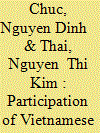

|
|
|
|
|
| Summary/Abstract |
Small and medium enterprises are prevalent in Vietnam. They are also the predominant type of enterprise in the three manufacturing industries surveyed: food; apparel; and wood products. These have been the emerging export sectors in the last decade. The survey shows that SMEs in these sectors are highly aware of ASEAN’s plan for SME development and perceive that the ASEAN Economic Community is beneficial to business. However, the share of SMEs that have business relations with firms in other ASEAN economies is small. There is also limited awareness of Vietnam’s Free Trade Agreements. The regression analysis reveals that foreign ownership and productivity are the two most important determinants of Vietnam SMEs’ participation in production networks. Product innovation, process innovation and membership in business associations also significantly increase the probability that SMEs participate in production networks. The analysis suggests that policies to develop SMEs, increase labour productivity, and intensify international integration will facilitate SMEs’ participation in regional production networks. Government can also craft policies to promote innovation, encourage membership in industry and business associations, and raise awareness of ASEAN’s SME development plans, the AEC and other business related issues.
|
|
|
|
|
|
|
|
|
|
|
|
|
|
|
|
| 15 |
ID:
144822


|
|
|
|
|
| Summary/Abstract |
Increasing regional economic integration amongst ASEAN member countries, and the creation of the ASEAN Economic Community (AEC) will bring both opportunities and challenges for local firms. This research investigates the perception and understanding of five Vietnamese food processing companies towards the AEC as well as their planned responses towards deeper integration. Case study interviews revealed that respondents had a limited understanding of the AEC, which moderated their strategic responses. Opportunities identified include access to new markets, the possibility of exploiting regionwide resources, and access to regional value chains. Increased competitive pressure, particularly from foreign investors, was the key anticipated challenge. Business responses focused on increasing intra-regional exports, cooperating with potential partner organizations, improving products and processes, and revising marketing strategies. Respondents also believed that the Vietnamese government could do more to support their businesses in the face of deepening economic integration.
|
|
|
|
|
|
|
|
|
|
|
|
|
|
|
|
| 16 |
ID:
124180
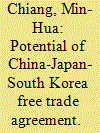

|
|
|
|
|
| Publication |
2013.
|
| Summary/Abstract |
This article explores the economic calculations behind the recent initiatives for the Free Trade Agreement (FTA) between the Governments of China, Japan and South Korea (CJK) and clarifies the implications for future regional economic integration. First, the proposed trilateral FTA signifies an advancement of China-centered regional economic integration. Regional economic integration led by China may also increase its political clout at the global stage. Second, the Governments of South Korea and Japan seek greater involvement in China's huge domestic market, but the former is concerned that a trilateral FTA will worsen its trade deficit with Japan, and the latter is afraid of losing its market shares in China and America to its Korean rival. Japan, therefore, seeks membership of both the CJK FTA and the Trans-Pacific Partnership (TPP). Third, China and the US' active involvement in regional economic integration will push the three countries to go forward towards greater economic cooperation. However, it will take longer for China-led Regional Comprehensive Economic Partnership (RCEP) and America-led TPP to bear fruit because of the large number of countries involved. Therefore, the conclusion of CJK FTA will be an important boost for the further progress of both RCEP and TPP. It will also be an important stabiliser for the trilateral political relations in the future.
|
|
|
|
|
|
|
|
|
|
|
|
|
|
|
|
| 17 |
ID:
180252
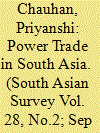

|
|
|
|
|
| Summary/Abstract |
South Asia is the fastest growing region in the world and is experiencing increasing demand for energy. As a result, countries are witnessing an excessive reliance on fuel imports, making themselves vulnerable to external price volatility and compromising on energy security. Power trade in South Asia can meet the challenge of increasing energy demand owing to complementarities in resource endowments and peak demand. Power trade in South Asia has increased over the years but is below potential. However, there are various challenges due to lack of institutional structures and frameworks for developing regional power trade models. The examples of power integration models in Europe, that is, the Nordic power market, and in Southeast Asia, that is, power trade in the Greater Mekong Subregion (GMS), can provide useful lessons and international best practices for regional power trade to be replicated in the South Asian context. Based on this, the objective of this article is to evaluate the existing power trading mechanisms in South Asia, highlight the challenges to regional energy cooperation, outline the necessary instruments and catalysts to promote regional power trade in South Asia based on the case study of successful power trading arrangements, including the Nordic power market in Europe and the Greater Mekong Subregion (GMS) in Southeast Asia, draw on their experiences to identify key mechanisms and develop a template for greater regional cooperation in electricity in South Asia.
|
|
|
|
|
|
|
|
|
|
|
|
|
|
|
|
| 18 |
ID:
153419


|
|
|
|
|
| Summary/Abstract |
Regional economic integration has become the dominant development pathway promoted, endorsed, and followed by many developing country governments in South East Asia and globally. Focusing on hydropower development, this article shows how forces of globalization manifested in the Myanmar government’s strategies to promote economic growth are shaping the Salween River basin’s development trajectory. Contesting the general belief that economic development would help the country’s transition to full democracy and achieve peace, it illustrates how hydropower development plans in the basin are closely interlinked with human rights issues. Well known for its long histories of violent conflict involving the Myanmar military and ethnic armed groups in various states, hydropower development in the Salween River is not only linked to the ongoing peace process in Myanmar but could also have direct implications on the actual significance of the process. Despite the signing of nationwide ceasefire agreements in 2012, hydropower dam projects could contribute to and trigger reoccurrences of violent armed conflict. Recognizing this conflict-prone and politically fragile condition as the main characteristics of Salween water governance is essential if we are to strive for sustainable and just development.
|
|
|
|
|
|
|
|
|
|
|
|
|
|
|
|
| 19 |
ID:
121989
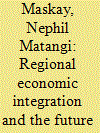

|
|
|
| 20 |
ID:
103073


|
|
|
|
|
|
|
|